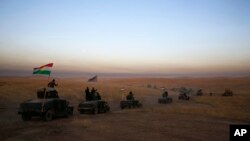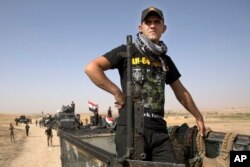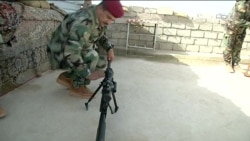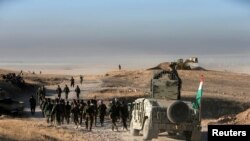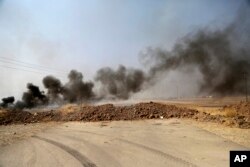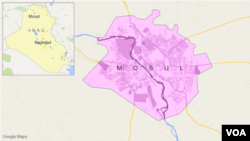Prime Minister Haider al-Abadi has promised only regular Iraqi forces will enter Sunni-dominated Mosul in the battle to oust jihadists who have controlled the city for two years. However, in the runup to the assault, leaders of Shiite militias say they will be part of the liberation of the Islamic State terror group’s last major Iraqi stronghold.
And some have threatened to attack U.S. special forces and military advisers assisting in the offensive to retake Iraq’s second-largest city.
The threats are prompting alarm that Shiite militias won’t abide by the Iraqi government’s orders to stay out of the urban center and to restrict their operations to villages on the outskirts of Mosul, home to more than 1 million people.
Qais al-Khazali, the secretary-general of the Shiite Asa’ib Ahl Al-Haq, one of the 40 Iran-influenced militias making up the Popular Mobilization Units (PMU), issued heavily sectarian threats. He insisted his fighters will help to liberate Mosul “in vengeance against the slayers of Hussein,” a reference to Sunni Muslims.
The comments were made in an Iraq television interview recorded by a monitoring group, the Middle East Media Research Institute (MEMRI). In the interview, the cleric said Shiite fighters “are fighting out of love for [Imam] Hussein. When they fight, they are killing the enemies of Hussein. The enemies of Hussein are the enemies of the Messenger of Allah.”
He added: “Dear brothers, the Popular Mobilization Units must participate in the liberation of Mosul. But this is old news. The Popular Mobilization Units will participate in it. We are not asking for anyone’s permission.”
WATCH: Civilians Flee as Battle for Mosul Begins
Shiite, Kurdish fighters
In his televised address Monday announcing the start of the Mosul campaign, al-Abadi labored the point that only Iraqi armed forces would liberate the city.
“These forces that are liberating you today, they have one goal in Mosul which is to get rid of Daesh and to secure your dignity. They are there for your sake,” he told the city’s residents, using an Arab acronym for the extremist group.
But before the prime minister’s speech, military officials acknowledged that more than 25,000 troops, including paramilitary forces made up of Sunni tribal fighters and Shiite militiamen, will take part in the offensive being launched from all around the city.
Under the plan, say Iraqi military officials, Kurdish peshmerga forces from the east will act as a vanguard and then stop on the city’s edge, allowing Iraqi regulars to advance on the city’s urban center.
Likewise, Shiite militiamen are meant to stop short in the south and west, where they are focused on Tal Afar, on the city’s outskirts, leaving elite Iraqi units such as the 1st Battalion of the Iraqi Special Operations Forces, to lead the charge.
Several PMU militia leaders have expressed anger in the runup to the offensive over the presence of U.S. military advisers and special forces, and have threatened to attack them. Some have been quoted in regional media as saying the U.S. military is an occupation force and that they will fight the Americans.
Threats to U.S. troops
Khazali also has made public threats against U.S. troops, along with PMU leader Rayan al-Kaldani, who said this month, “The PMU will be dealing with any illegitimate and foreign forces in Mosul the way it deals with the gangs of the Islamic State.”
PMU militias, which have had support from the Iranian revolutionary guards Quds Force, are meant to fall under the command of Iraq’s security services but often shrug off orders from Baghdad. They have been credited as being crucial in the fight against IS and were seen as the key tactical factor in ousting IS fighters from the town of Tikrit 18 months ago.
Sunni Muslims and rights groups such as Amnesty International also have accused some of the militias of sectarian-motivated war crimes, including summary executions, torture and abductions. In the wake of claims of egregious behavior by the Shiite militias in Tikrit, Iraqi authorities declared perpetrators of war crimes would be punished. Top Shiite cleric Grand Ayatollah Ali al-Sistani urged militias to avoid war crimes.
Militia leaders insist abuses are isolated incidents.
U.S. Defense Secretary Ash Carter called the start of Iraqi operations to liberate Mosul “a decisive moment in the campaign” to deliver a lasting blow to the jihadists. Carter said the U.S. and other members of the international coalition “stand ready to support the Iraqi Security Forces, peshmerga fighters and the people of Iraq in the difficult fight ahead,” but he made no mention of Shiite militias.
U.S. officials have warned Shiite militia leaders that if they fail to coordinate their operations with the Iraqi security forces, they will risk being hit accidentally during the U.S.-led coalition raids.




